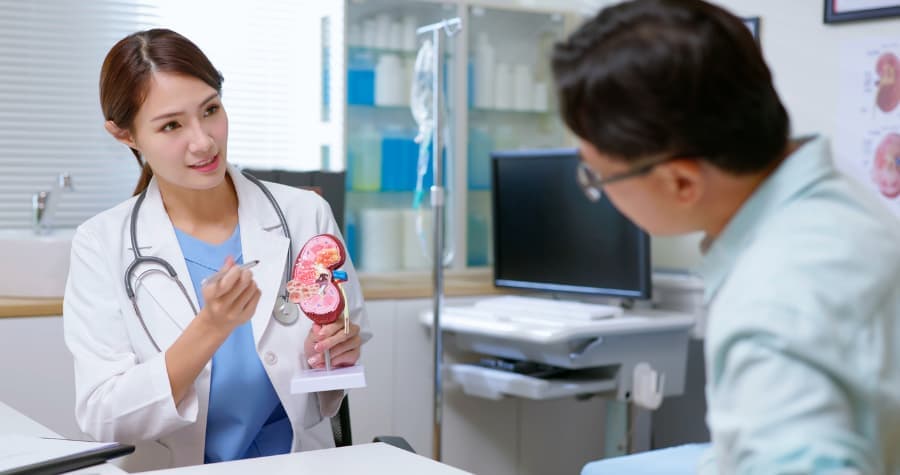Those who have experienced kidney stones know the pain they can cause. Although kidney stones are common, there are ways to prevent them. Here, the nephrology team at Richmond University Medical Center details what kidney stones are and explains different ways to prevent them from forming.
What Are Kidney Stones?
Urine contains various wastes along with dissolved minerals and salts. When urine contains too much waste in too little liquid, crystals begin to form. These crystals can attract other elements and bond together to create a solid. This formation is what is known as a kidney stone.
Kidney stones begin as small formations but can grow larger. Stones can remain in the kidney and not cause a person any pain or discomfort. More commonly, the kidney stone will travel down the urinary tract into the ureter, the tube between the kidney and the bladder. Kidney stones that reach the bladder can be passed by normal urination without causing too much irritation.
However, if the stone does not move, it can create a backup of urine in the kidney, ureter, bladder, or urethra. As a result, a person feels a tremendous amount of pain. This pain is often caused by kidney stones.
Who Can Get Kidney Stones?
Recent evidence suggests that kidney stone rates are on the rise in the United States. It is estimated that one in ten people will have a kidney stone over the course of their lifetime. Additionally, half of those who’ve already experienced a kidney stone get another within seven years.
Kidney stones can affect anyone at any age. While no one is exempt from getting a kidney stone, some people are more likely to get them than others. According to American Kidney Fund, men get kidney stones more often than women. Kidney stones are also more common in non-Hispanic white people than in people of other ethnicities.
The chances of getting a kidney stone increase with the following risk factors:
- A family history of kidney stones
- Being overweight or obese
- Having diabetes
- Problems with the digestive system
- Taking certain medications, such as calcium-based antacids
- Failing to drink enough water
- Previous personal history of kidney stones
- Having undergone gastric bypass surgery
Ways to Prevent Kidney Stones
Reducing the risk of kidney stones begins with a proper diet. Making modifications and adjusting nutritional intake may help to prevent stones from forming. Consider implementing the following diet and nutrition efforts:
Increase Water Intake
Getting enough water is vital for a variety of reasons. In addition to hydrating the body, water helps to dilute the substances that can lead to kidney stone formation. Everyone should strive to drink eight to 12 cups of water per day, depending on activity level and rate of perspiration. Citrus beverages, such as lemonade and orange juice, are good additions to fluid intake, as citrate has been found to help prevent stone formation.
Reduce Salt and Sodium
The amount of calcium found in the urine increases with a high-sodium diet. Therefore, a low-sodium diet is recommended to help reduce the risk of kidney stones. Current guidelines suggest limiting sodium intake to no more than 2,300 milligrams (one teaspoon) a day. Doing so can also benefit the body in other ways, including lowering blood pressure and contributing to heart health.
Limit Animal Protein
Animal protein, such as red meat, poultry, eggs, and seafood, has been linked to a higher risk of developing kidney stones. Reducing meat consumption is beneficial because it decreases the risk of uric acid kidney stones. Anyone at a higher risk of kidney stones should limit their intake of animal protein to no more than six ounces a day.
Eat More Calcium-Rich Foods
Calcium from foods binds to oxalate in the intestines, decreasing the amount of oxalate that the kidneys excrete. A lower concentration of oxalate in the urine helps to prevent kidney stones from forming in the body. To reduce the risk of kidney stones, consider eating more calcium-rich foods, such as:
- Dairy products
- Leafy, green vegetables
- Salmon
- Breakfast cereals
- Tofu
Discover More on How to Prevent Kidney Stones
While there is no guaranteed way to prevent kidney stones, there are many preventative measures that can help reduce the likelihood. Richmond University Medical Center offers nephrology and urology services and specializes in treating a range of kidney-related challenges, including kidney stones. With a focus on advanced diagnostics and evidence-based treatments, our team helps patients in Staten Island, NY, manage their symptoms and prevent kidney stones from reoccurring. Contact us today to learn more about kidney stone preventative measures, or to schedule an appointment with our dedicated team.




